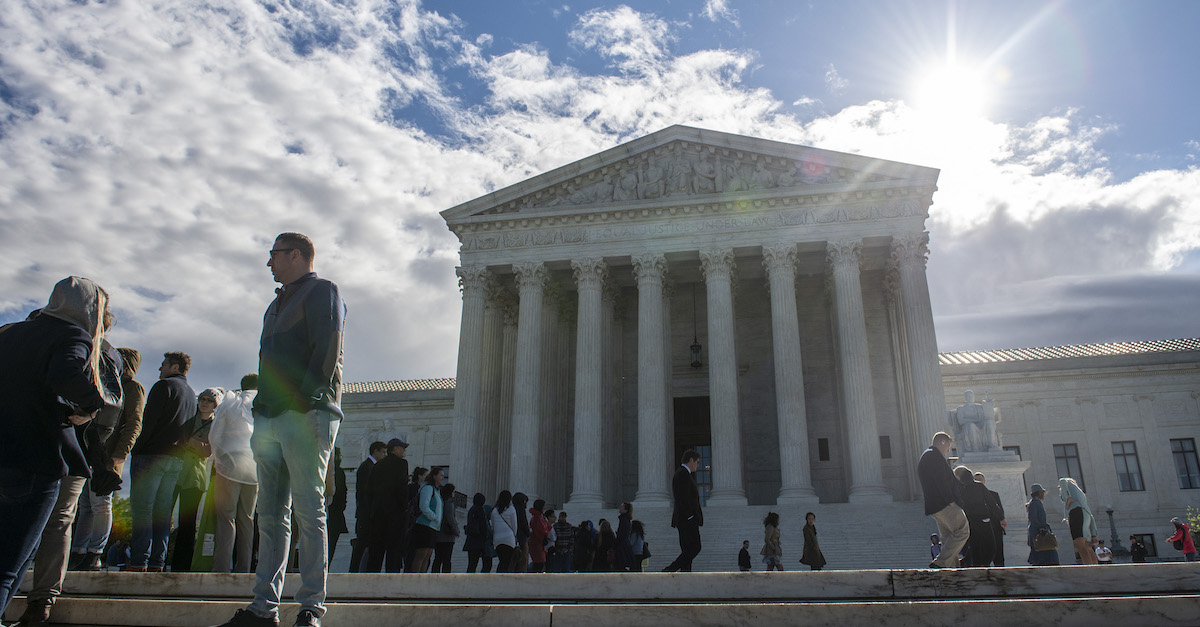
The Supreme Court is hearing oral arguments Monday in New York State Rifle & Pistol Association Inc. v. City of New York. The case brings up guns, strategy, and President Donald Trump‘s thoughts on his former home state. It’s the first gun rights case to reach SCOTUS in 10 years.
Here’s what’s happening.
- Both the arguments for and against NYC’s law seem like something of a stretch.
New York City’s prohibition outlawed carrying a licensed, locked and unloaded handgun from inside the city to outside the city. Effectively, that means that an individual licensed to carry a gun would be allowed to carry that gun to a shooting range inside NYC, but that same person could not legally carry that same gun to a shooting range outside the city. NYC doesn’t contend that the law is directly connected to public safety, but rather, that it is necessary to help the city enforce other firearms regulations.
Challenging the law, petitioners call the NYC law, “an extreme, unjustified, and irrational restriction on Second Amendment rights;” they argue that the ban violates the Second Amendment, because it impedes their right to keep arms in their homes. The logic (tenuous as it may be) goes that if folks can’t transport their guns to gun ranges and vacation houses, then it’ll be too much trouble to keep them in their homes at all.
- NYC knows SCOTUS can’t be counted on to uphold gun regulations, so it attempted to outmaneuver the Court.
NYC knows there’s more at stake in this case than just its own law, and it doesn’t want to give the Court the chance to hand down another Heller-like decision. A Supreme Court decision against NYC’s regulation could adversely impact other gun control laws across the country. Deciding to reduce the gamble, New York legislators preemptively changed the law before the case went before the high court, and relaxed the regulations to allow the transportation of a licensed firearm, “to a home, business, or shooting range outside city limits.”
The strategic move didn’t go over well with Second Amendment advocates, some of whom voiced their opinions during the public commenting period mandated before any regulatory change could be affected.
- There’s a good chance the Supreme Court won’t decide the case on Second Amendment grounds at all.
Because New York’s law has now been amended, there’s a pretty good argument that the dispute over that law is moot. That mootness could have given SCOTUS a reason to bow out altogether, which it opted not to do – a decision gun-rights advocates hope indicates the Court’s eagerness to smack down New York’s attempt to restrict gun rights.
Mootness will be the first issue argued to the Court Monday, and it may well be the deciding factor in the case’s ultimate outcome.
- There is an ongoing feud that underlies the whole legal battle.
Although the lawsuit before SCOTUS is between individual plaintiffs and the City of New York, the broader context is important. The case is also another round of President Trump (pro-gun, anti-regulation, and anti-New York) versus New York Attorney General Letitia James (who hasn’t been shy with sharing her feelings about the president).
Although the Trump administration isn’t a party to the lawsuit, it filed an amicus brief in support of the petitioners’ position. In that brief, the administration argued that, “the purposes of the right to keep and bear arms confirm that the right includes the freedom to take arms from the home to appropriate places outside the home.”
Trump accused James and New York Gov. Andrew Cuomo (D) of attacking the NRA by “illegally using the State’s legal apparatus to take down and destroy” the gun rights group. James’s office released a statement about the lawsuit, vowing that her office would focus on enforcing the rule of law, and chastising, “We wish the President would share our respect for the law.”
[image via Eric Baradat/AFP/Getty Images]